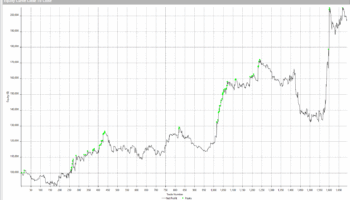What computer is the best for StrategyQuant? How does minimal and top configuration look like?
You often ask about the computer you should buy for working with SQ. In this article, I’d like to summarize some facts to make the whole topic clearer.
Let’s have a look at the frequently asked questions.
What CPU and how much RAM should I have?
Minimum recommended configuration is a dual core – i3, 8 GB of RAM, 250 GB free hard disk space. With this configuration the RAM memory is probably the biggest limitation, you wouldn’t be able to keep more than a few thousand strategies in memory.
The ideal configuration is an i5, i7 or compatible processor with as many cores as possible, 32-64 GB RAM or more and an SSD disc. There isn’t much sense in using more than 64 GB RAM, it is better to invest into a better processor.
But don’t worry, having a weaker computer doesn’t mean that you cannot build strategies, you’ll only have to modify your work configuration accordingly – keep less strategies in databank, don’t run expensive robustness tests such as Walk-Forward Matrix and so on.
Having a more powerful computer will speed up the generation significantly – the difference could be (for example) between10.000 strategies per hour on a laptop vs. 600.000 strategies on dual Xeon 48-cores computer with the same configuration.
More computing power doesn’t mean you’ll have better results, it depends on how you use the power you have – your build and workflow configuration.
Notebook or Workstation?
It depends on the purpose of your computer, whether it is for 24/7 work and you need high performance, or you just need more powerful workstation. Cheaper notebooks are definitely not built for operating 24/7.
Therefore, if your computer should run nonstop, I would recommend a desktop PC or server. If you just do some additional tests and you need to be mobile, then I recommend a laptop. In case you need high performance, the workstation will also be cheaper solution.
If you cannot or don’t want to afford it, it is ok to run SQ also on a laptop, just manage your expectations.
What about VPS?
It is possible to run SQ also on VPS, but keep in mind that most VPS servers aren’t very powerful. They might be even less powerful than a notebook.
Dedicated server is a better option, you can get a very decent i7 / 64 GB RAM dedicated server for as low as 50 Eur per month from various providers, for example from Hetzner:
https://www.hetzner.com/dedicated-rootserver/matrix-ex
It is definitely an option that allows you to pay monthly fees and have your server available 24/7.
New or refurbished?
It depends on your priorities.
Refurbished (used) servers and workstations provide the best value for money. Refurbished PCs can be purchased with a guarantee for example on ebay.com or www.bargainhardware.co.uk
It is possible to buy a refurbished Dual Xeon 48 core PC for around $1000, which is a every good configuration for a very affordable price.
We at StrategyQuant have several such servers and without any problems so far.
If you want top of the top you can buy the new i9 or AMD Threadripper, but for much higher price.
How to set memory in SQX according to the configuration of your PC?
Watch the YouTube video at our YT channel.
Minimal recommend configuration for smooth work
CPU 4 cores, 16 GB RAM, 512 GB SSD or NVMe Hard Drive, GPU Optional – for comfortable work we recommend resolution Full HD 1920×1080
Optimal recommend configuration for quick build
CPU 20 cores, 64 GB RAM, 512 GB SSD or NVMe Hard Drive, GPU Optional – for comfortable work we recommend resolution Full HD 1920×1080
Top advanced configuration
2x CPU 20 cores or more, 128 GB RAM (or more if you work with many strategies in the data bank), 1 TB SSD or NVMe Hard Drive, GPU Optional – for comfortable work we recommend resolution Full HD 1920 x 1080
Check our video on our YouTube about which configuration is the best:
Summary
You don’t necessarily need to buy a new computer only for StrategyQuant. A relatively ordinary notebook is sufficient, and you will be able to build a portfolio of strategies if you are willing to accept its limitations.
A powerful workstation is not necessary, but it will speed things up and save your time.




I have a Full license for the program.
Q: will my program run fully on a dedicated server?
Hello,
yes, that should work without any issues
I am preparing to buy a new computer. I’m deciding between Core i (specifically i9 13900K) or Xeon. I researched and found that Xeon is suitable as a workstation. So should I choose core i or xeon?
Tengo la misma duda
Xeon processors are intended for everyday long-term loads, in which they should work without difficulty. Intel Cores can also handle and deliver solid performance, especially the top-of-the-line Core i7, but they’re not meant to run all day under heavy loads.
I have a Gaming Laptop, AMD Ryzen 7 4800H with 16 GB Ram, and I have been told that is not good enough to run the program, and I will burn the laptop if I decided to use it. Any comments in that regard?
Yes, you should be fine run most of the operation. If you are able to upgrade your RAM to 24G or 32G it would give you a lot more options to optimize and do robustness testing easily
!Buenas, que procesador es mejor para correr SQX, un procesador AMD Ryzen 9 7940HS con 8 nucleos y 16 hilos o un i9 13900H con 14 nucleos y 20 hilos? Siendo el AMD mas potente en multicore que el intel? O sea la verdadera pregunta es que importa mas, la cantidad de nucleos e hilos o la potencia general multicore del procesador?
Are processors with a higher number of cores and threads more useful? Or is raw power with higher benchmarks results better?. For example i9 14900k vs dual xeon e5 2697 v4.